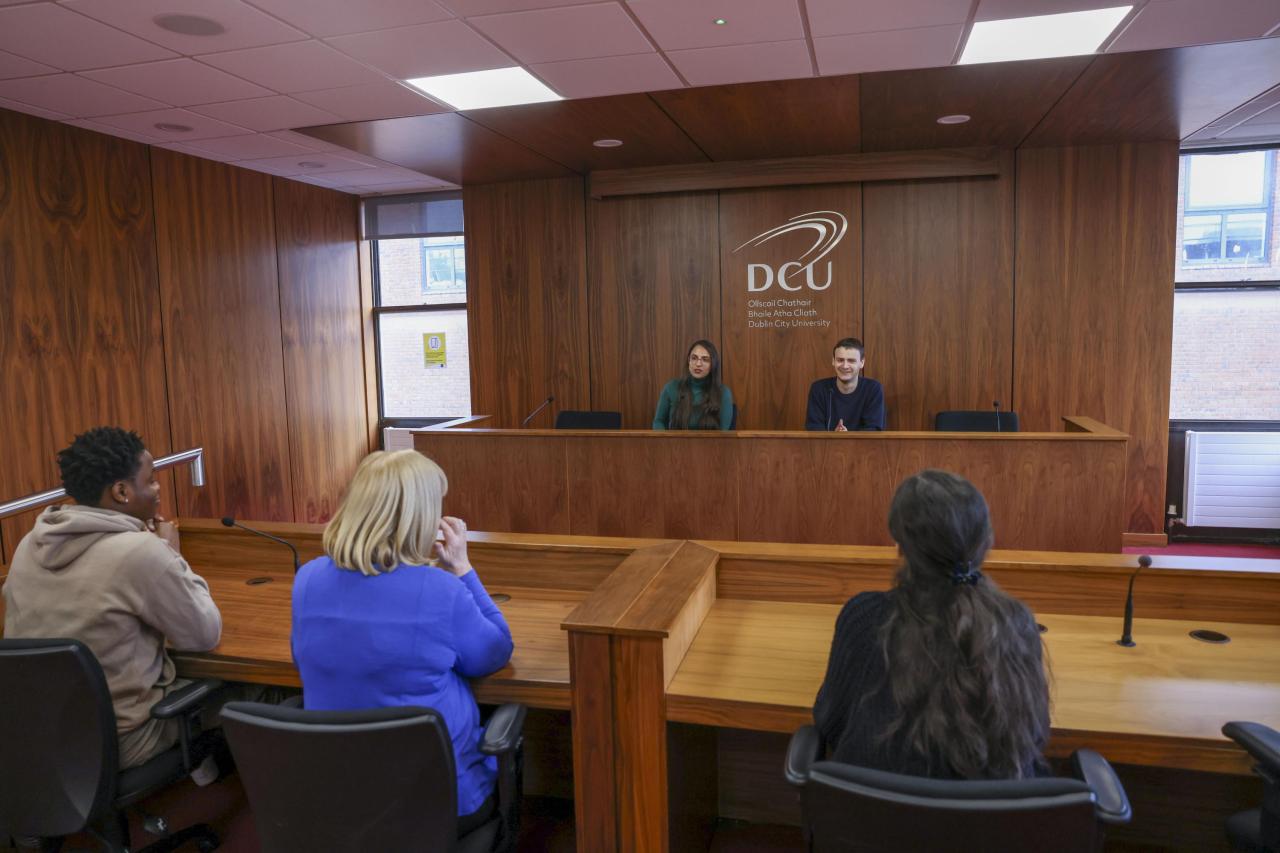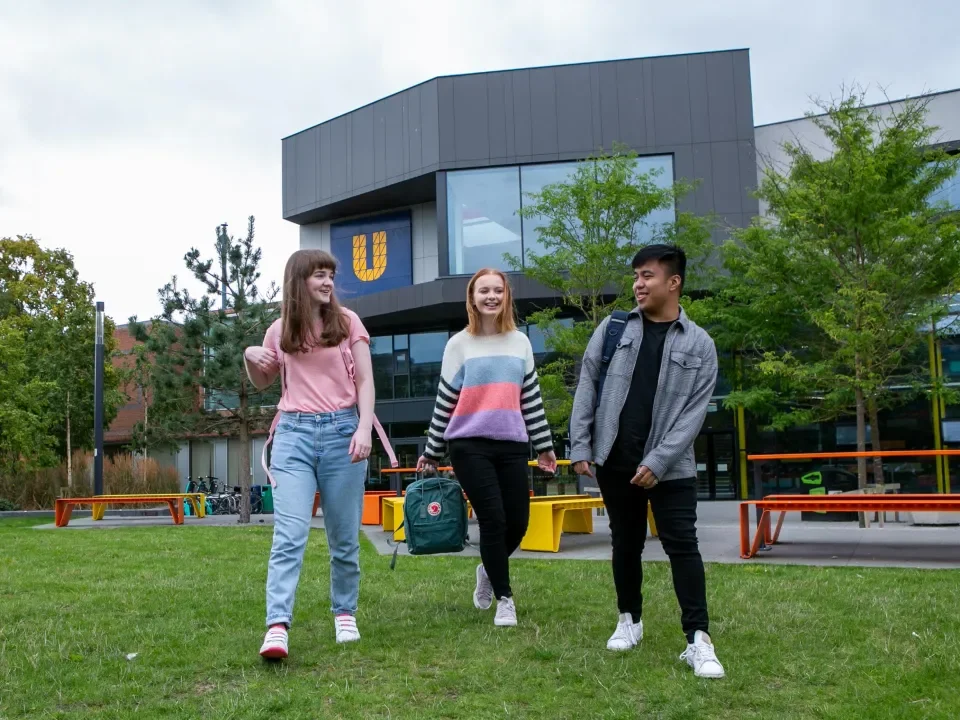Overview
Choosing the law stream on the Bachelor of Arts at DCU will allow you to explore the key foundations of law while also studying another discipline. This will provide you with an interdisciplinary education, covering many important areas of law while also choosing from History, International Languages or Media Studies.
The course will allow you to study all 8 of the core modules examined in the entrance exams to the Law Society as a trainee solicitor. These are constitutional law, contract law, criminal law, property law, equity and trusts, European Union law, tort law, and company law.
You’ll have the option to take a year abroad, extending your degree to four years and graduating with a Bachelor of Arts (Joint Honours) International.
Internship Year You can opt to apply for a year-long INTRA work placement in Year Three. This will give you a unique opportunity to enhance your CV, increase your employability and experience the relevance of your study in the real world. This option is competitive and subject to the availability of placements. For more information on the INTRA programme at DCU, please visit www.dcu.ie/intra
This programme will prepare you for a variety of careers and also provides a foundation for postgraduate study.
DCU People
Careers & Further Options
Careers
While many law graduates enter the legal profession, many more choose alternative careers – in business, media, education, advocacy and the NGO sector, international organisations, and the civil service. A law degree aims fundamentally to develop critical thinking and analytical skills – hence the adaptability of law graduates across and within these and other domains. The Bachelor of Arts: Joint Honours (Law) programme allows the student to combine legal study with another discipline, thereby keeping more career options open at the completion of the degree programme. (For those interested in becoming a barrister, please see our BCL degree which is accredited by the King's Inns.
Career Areas:
- Advertising
- Education
- European Affairs
- Historian
- Journalist
- Law
- Policy evaluation
- Print and online media
- Public Relations
- Research publishing
- event management
- Arts administration
- Government services and local administration
- Communications
- Publishing
- Management consultancy
- Politics
- Heritage and tourism
- Skills are valued in particular in the export sector
- Multinational corporations and international organisations
- Work in international NGOs and European institutions
Entry Requirements
In addition to the general entry requirements for admission to the university the following entry requirements apply
Additional requirement for International Languages:
French: Minimum of H4 in French
German: Minimum of H4 in German
Spanish: Minimum of H4 in Spanish
Additional requirement for Media Studies:
Media Studies: Minimum of H4 in English
In addition to the general entry requirements for admission to the university the following entry requirements apply
Additional requirement for International Languages:
French: GCE A Level C French
German: GCE A Level C German
Spanish: GCE A Level C Spanish
Additional requirement for Media Studies:
Media Studies: GCE A Level C English
Please visit our Admissions webpage for details on course requirements or how to apply to DCU.
Please visit our QQI FET webpage for details on DCU courses, open days, campus tours or school visits.
To apply to DCU, please visit www.cao.ie.
Mature entry is a competitive process. Applicants must demonstrate:
- a genuine interest in the programme(s) they are applying for
- academic experience and competency in their chosen field of study
- an ability to engage and succeed on the programme
All applicants must complete a statement of interest to be considered for the mature application route.
For further guidance on the mature application process please see the CAO Website
Applicants that have completed at least one year of study at NFQ Level 6, 7 or 8 at another institution may apply to continue their studies on a similar programme at DCU. There should be substantial overlap in content between the two programmes to be considered for a transfer. Results and other supporting documentation must be submitted to CAO by the closing date of 1st July. This is a competitive application process for a small quota of advanced entry places. Offers are made on a rolling basis until all places are filled. Early application is advised. Please note: Applicants should also consider applying through the appropriate route for first year entry to the programme they are interested in. This application process is only for advanced entry.
International candidates are expected to have educational qualifications of a standard equivalent to those outlined above. In addition, where such candidates are non-native speakers of the English language they must satisfy the university of their competency in the English language. For further information on international applications click here.
Course Structure
Law (DC292)
Select Law + One other subject from:
History | International Languages | Media Studies
Law: You will take a wide range of law subjects which will provide you with an insight into the complex and interesting nature of the Irish and EU legal systems.
History: You will explore how human beings behave grounded on a close examination of how they have behaved in the past in all spheres of the world but with a particular emphasis on Ireland.
International Languages (French, German, Spanish): You’ll acquire proficiency in your chosen language and learn about culture, film, literary traditions and intercultural communication.
Media Studies: You'll learn how we are shaped by culture, about the social and economic pressures on media organisations and the way mass media are used by government, corporations and others to influence us as citizens and as consumers.
Fees and Funding
Fees
How To Apply
Applicants presenting EU School Leaving/FETAC Level 5 examinations: Apply through the Central Applications Office (CAO) by 1st February or 1st May
To apply for this programme:
Candidates should apply directly here. Here's a quick step by step guide if you need help with your application.
Please provide
- Academic Transcripts for each and every year of study with English translation, if applicable.
- If applicable, provide evidence of competence in the English language as per DCU entry requirements.
Applications are accepted on an ongoing basis up to 1st July. All Non-EU candidates are advised to apply early, as places are limited.
All mature applicants apply through the CAO by 1st February. For further information and for special application procedures click here
Applications are made via the CAO Advanced Entry route which will open on the 5th of November to 1st July.
Please see Application Procedures or E-mail ugadmissions@dcu.ie.
Candidates submitting EU examination results are required to apply through the CAO at www.cao.ie
Candidates submitting non-EU examination results are required to apply directly here
Life On Campus
At DCU, our students can expect a unique campus experience. We are known for our excellent teaching and learning facilities, our active clubs and societies, and our great social and sporting facilities. All this makes DCU an exciting place to be.
DCU has three academic campuses; Glasnevin, St. Patrick’s and All Hallows (both in Drumcondra), all close to Dublin City centre.
They can be reached by public transport, Dublin Bus and Bus Éireann, with our Drumcondra campuses a ten minute walk from Drumcondra Train Station. Glasnevin is a 20 minute walk from St Patrick’s and All Hallows. They are also linked by Dublin Bus.
Each campus has a library (O’Reilly, Cregan and Woodlock Hall), study spaces, restaurants, and on-campus residencies. There are sports facilities on Glasnevin and St. Patrick’s, and there is a dedicated sports campus, St Claire’s, located near Glasnevin on the Ballymun Road.
DCU’s 19,000 students have access to exceptional teaching and learning facilities across our three academic campuses.
These include modern learning theatres, research centres, a new media and TV studio, radio/podcast studios, computer suites and advanced labs in the areas of Languages, Engineering, Physics, Chemistry and Biotechnology, as well as a Sports Performance centre and a training hospital ward. In 2021, we opened our first virtual reality ‘Leadership Lab’, which is located in our Business School.
We continue to improve and update our facilities. For example, construction of a new world-class STEM facility is underway on the Glasnevin campus. With capacity for an extra 3,000 STEM students, this facility will advance DCU’s international reputation for excellence in science and health, computing and engineering disciplines.
Studying in DCU isn’t just about course work. The university is rich in student life and activities.
There are more than 140 clubs and societies for students in DCU, with ‘Clubs & Socs’ days taking place on both the Glasnevin and Drumcondra campuses at the start of the academic year. They span everything from rugby to rock climbing, anime to jazz.
For many students, sport is an important part of the DCU experience. DCU’s Sports Complex boasts a 25 metre swimming pool, fitness centre gym, all-weather pitches and squash courts, as well as soccer, GAA and rugby pitches. DCU Dóchas Éireann, the university’s GAA club, is the largest third level Gaelic Games club in the country. Meanwhile, DCU Athletics has been Ireland’s highest achieving university club for many years. And DCU has dozens of other clubs to get involved in, from Archery to Weightlifting.
The Glasnevin campus is home to our purpose built, state-of-the-art student centre, The U, which serves the needs of a rapidly growing student body. Here, you will find the Student Leadership and Lifeskills Centre, performing arts and cultural spaces for students and the wider community, and the Entrepreneurship and Innovation Hub. Also located on our Glasnevin campus is The Helix, our renowned performing arts centre.
On our St Patrick’s campus, we have the Java Student Hub, a vibrant, warm and welcoming space where students can meet for coffee, play music, use the projector to watch events, or just relax. The walls of the Java Hub were designed based on the cultural history of St Patrick’s Campus, including the special references to the notable sporting history and history of the arts.
We have a number of academic, professional and social supports for students.
Student Advice & Learning Skills Centre - Offers a wide range of supports and services to students and advice
The Writing Centre - drop-in writing workshops for students through the academic year
Maths Learning Centre - provides maths support for students of all ability levels with maths modules
Student Learning - facilitate the transition from passive to active learning for students at DCU, by teaching study skills, nurturing critical thinking and building student confidence.
Careers work with students to help them on their professional journey into graduate employment.
Our student support team offers a comprehensive support programme, helping students make that all important transition into university life and focusing on building confidence and skills which are key to success at third level.

DCU Glasnevin Campus
FAQs
Is DCU all one campus?
DCU is a multi campus university - the Glasnevin, St Patrick's and All Hallows campuses. The St Patrick's campus is where the Education courses are taught and some of the subjects from the BA Joint Honours degree. There is a 20-25 minute walk between the campuses but there are buses and bikes available to go between them also.
Click here to see maps of all of our campuses
If I'm studying on the St Patrick's campus, can I use the library and sports centre on the Glasnevin campus?
Yes, all facilities such as sports and accommodation are open for all DCU students to avail of.
Are there libraries in DCU and if they have wifi and work stations?
We have a brand new state of the art four floor library on our St. Patrick's Campus which complements the existing library on the Glasnevin campus. There is free wifi, work stations as well as desktop computers.
Does DCU provide accommodation?
DCU does have on-campus accommodation for undergraduate and postgraduate students, and you can find out more and apply via the Accommodation Office webpage.


